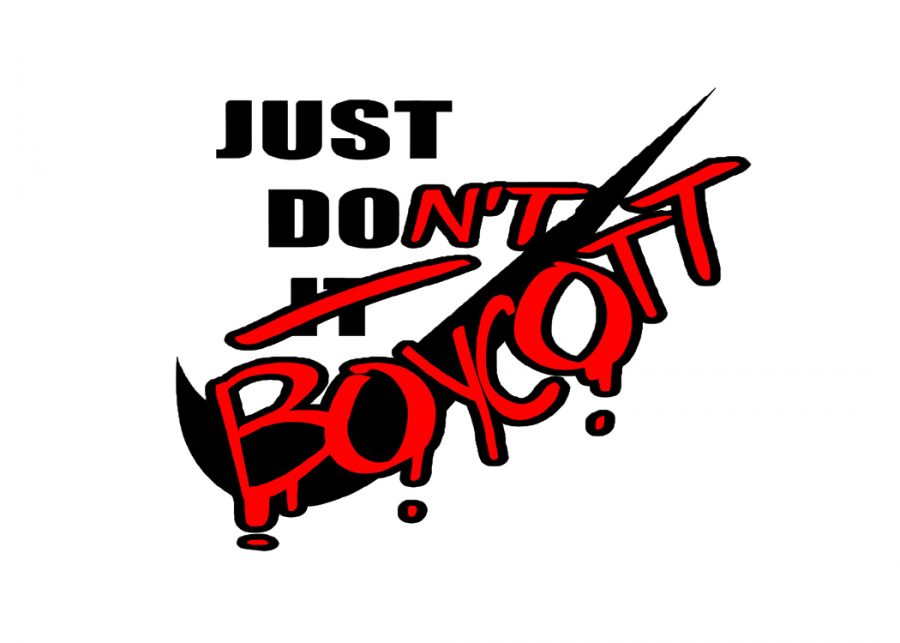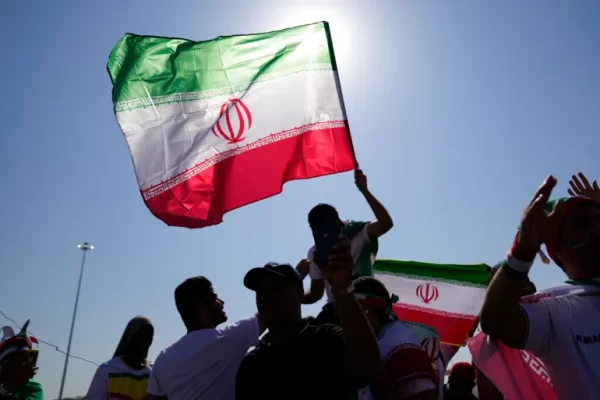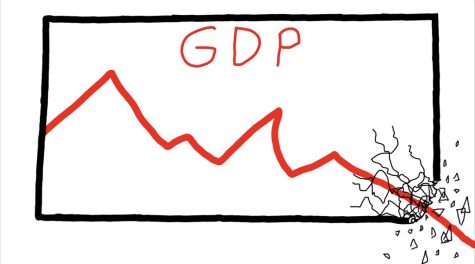POINT/COUNTERPOINT: The Nike Boycott
October 22, 2018
ANTI-BOYCOTT – Camilla O’Keefe, Junior
The recent Nike ad featuring Colin Kaepernick has sparked significant hate from many when he famously kneeled during the national anthem. He chose to do so because while all Americans may be created equal, they are not treated equally. Many interpreted this to be unpatriotic and disrespectful, including President Trump, who said that any player who took a knee should be fired. The ad featured the tag line, “Believe in something, even if it means risking everything.” In and of itself, this idea could not be offensive to any patriotic person — fighting for an unpopular ideal is as American as dumping tea in Boston Harbor, publishing “Uncle Tom’s Cabin” to support the abolitionists’ cause, marching to demand women’s suffrage, or boycotting the segregated buses in Montgomery alongside Dr. King. It was after they plastered the slogan across Kaepernick’s face, however, that people began to deride Nike on social media and burn their own Nike merchandise. Criticism of Kaepernick and Nike is ultimately hypocritical.
When taking a knee, Kaepernick was peacefully protesting racism and police brutality. His protest was never intended to say that all police officers mistreat people of color, but to open up a dialogue about the fact that such behavior does exist among some in law enforcement. Such misbehavior should not be accepted or tolerated by any of us.
Earlier this year, in Charlottesville, protestors, including some identified as white supremacists, marched, chanted racist remarks, and physically harmed others. Police rarely interfered with participants, and the president said some of them were, “very fine people.” If those marching in Charlottesville are allowed to “believe in something, even if it means risking everything,” then no one should have a problem with Kaepernick’s protest and Nike’s support for it. It is hypocritical for politicians to support controversial speech only when it suits their best interests, and unpatriotic for citizens to do the same.
Those boycotting Nike are doing so because they used Kaepernick in their ad, not because they disagree with the sentiment of the slogan. Once one recognizes this, the hypocrisy of this ban becomes more apparent. Why have they not taken action in similarly contentious situations? Did anyone burn their Baltimore Ravens jerseys from Modell’s when Ray Rice was filmed beating up his fiancé? Did they boycott Nike for their endorsement of Michael Vick after he was convicted of animal abuse? Is it only inappropriate to protest the mistreatment of women or animals, while it’s fair game to allow minorities to be abused? If so, stop hiding behind the false disguise of patriotism, and put on your white hood proudly, because you are exposing an inherent racism that perhaps you didn’t even know you had.
Stop pretending that your outrage is about patriotism or show of support for law enforcement. And stop pretending that boycotting Nike will solve the problems surrounding either. As Beyoncé said, “Racism is so American, that when we protest racism, some assume we are protesting America.” While we ponder that, consider this. We have to learn to agree to disagree, and to do so without boycotts. That doesn’t strengthen us as Americans. Author Evelyn Beatrice Hall once wrote, “I may disapprove of what you say, but I will defend to the death your right to say it.” That’s what free speech is about. It’s ironic we had to learn that from a British author!
~~~~~~~~~~~~~~~~~~~~~~~~~~~~~~~~~~~~~~~~~~~~~~~~~~~~~~~~~~~~~~~~~~~~~~~~~~~~~~~~~~~~~~~~~~~~~~~~~~~~~~~~~~~~~~~~~~~~~~~~~~~~~~~~
PRO-BOYCOTT – Stephen Tahbaz & Madison Popovic, Juniors
Nike’s slogan, “Just do it,” has been redefined over the past several weeks when Colin Kaepernick, a former NFL player, became the face of the new Nike advertisement campaign. Kaepernick brought politics into football by kneeling during the national anthem. This resulted in a firestorm of controversy. On September 5, Nike released an advertisement in which Kaepernick encouraged the viewers to “believe in something, even if it means risking everything.” This controversial statement has aroused reactions across America, leading some to destroy their Nike products and a few local governments to encourage a boycott of Nike products, with even the president of the United States weighing in on the new ad.
President Trump responded to the ad with a tweet, saying, “Nike is getting absolutely killed with anger and boycotts.”
While Nike’s stock received a brief spike in sales of 31 percent after the ad ran, according to Marketwatch, their shares have since stabilized and even dipped in conservative states, where consumers are not purchasing Nike goods.
“Sales declines seems to be steeper in more conservative states….[with] the biggest drop in sales in Idaho, followed by Wyoming, South Dakota, Montana and West Virginia,” Lauren Hirsch reported in an article for CNBC.
The economic consequences of the ad are significant. Even North Smithfield, a town in Rhode Island, briefly requested that its town departments refrain from purchasing Nike products.
There is an irony to Nike politicizing their product with a seemingly “pro-progressive American message.” They are the same company that has a hideous record of human rights violations in factories overseas. A study from Stanford University revealed multiple incidents in the 1990s where Nike affiliate factories underpaid and overworked laborers in miserable conditions. Alongside this, U.S production accounts for seven percent of Nike goods, and less than one percent of their total workforce.
For the good intentions of Kaepernick’s “risk everything for what you believe in” message, he is just a media puppet that Nike has utilized in hopes of inspiring a false sense of patriotism when all they really want to do is sell some sneakers. Ultimately, it is the disrespect that many feel Kaepernick has demonstrated that leaves a stronger impression than any uplifting motto ever can.







